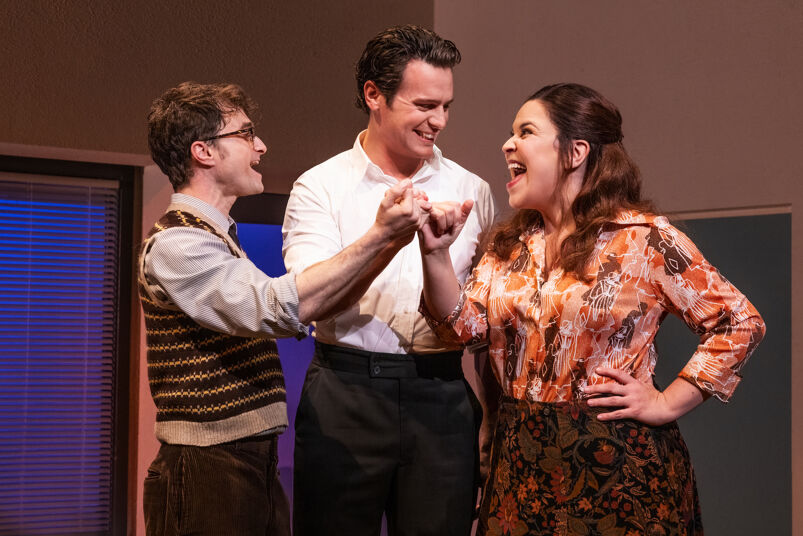
Closing in 1981 after a paltry 16 performances, Merrily We Roll Along was dubbed “a shambles” by then chief theater critic of the New York Times, Frank Rich. Returning to Broadway for the first time with a trifecta of stage and screen stars, including Jonathan Groff, Daniel Radcliffe, and Lindsay Mendez, that same news outlet dubbed the show a “palpable hit.” Somewhere in musical theater heaven, Sondheim, with that sly grin and squinty eye, is likely muttering, “I told you so.”
Director Maria Friedman and choreographer Tim Jackson first staged this version (there have been many) in London in 2012, which then transferred to the West End. In 2017, the production jumped the pond for a regional run at Boston’s Huntington Theater and reappeared again in 2022 at Off-Broadway’s New York Theater Workshop with its current lead actors.
Related:
Jonathan Groff and Daniel Radcliffe bring new life to Sondheim’s ‘Merrily We Roll Along’
Jonathan Groff, Daniel Radcliffe, and Lindsay Mendez co-star in a revival of Sondheim’s musical about failed friendships.
Fans have long obsessed over the musical, which features a book by George Furth and is based on a play by George S. Kaufman and Moss Hart about three friends whose lives implode. The reverse chronological storytelling convention proved a perilous stumbling block for original director Harold Prince and the cast, mainly comprised of actors in their teens and early 20s — so much so that it became the subject of a documentary film, Best Worst Thing That Ever Could Have Happened, directed by one of the musical’s original stars, Lonny Price.
Merrily We Roll Along charts the friendships of Frank (Groff), a career-climbing composer-turned-filmmaker with a penchant for cheating and money; Charley (Radcliffe), who romanticizes the starving artist cliche despite penning a hit play; and Mary (Mendez), the perennial BFF with unresolved romantic feelings for Frank and a drinking problem that threatens to derail her career as a modestly successful writer.
The musical begins in 1976 at Frank’s Bel Air home amid a pretentious celebration of his latest film. With harsh words exchanged and cocktails thrown, Sondheim’s million-dollar question reverberates: “How did you get to be here?” The circumstances stumble backward — a professional meltdown, divorce, infidelity, lucky chances, and first meetings, until we find ourselves on a New York City rooftop circa 1957… the beginning of the end.
Queerty sent features editor Matthew Wexler and contributor Kelsy Chauvin to Broadway’s Hudson Theatre to catch a performance several days after opening night. They chatted the following morning about the menace and merriment of getting older when set to a Sondheim score.
Matthew: How are you feeling?
Kelsy: Not bad. I read your review of the Off-Broadway production and agree with many of your points.
Matthew: Yeah, I hadn’t looked at it since last year. Now that you slept on it, what was your initial response?
Kelsy: I made notes in the subway station while it was fresh. And the thing that I’m still thinking about is the parallel of friendship and success. And they can kind of be the same thing. I’m very proud of my lifelong friendships, but some have fallen to the wayside, just like some vocational or artistic goals have softened or gone away altogether. And others have risen. And I appreciate that parallel in this story. Although it’s portrayed as very black-and-white — you can’t have success and artistic integrity, which is kind of depressing. But that’s a bit of the world we live in, considering the nature of capitalism. It made me ask what defines a true friendship versus a transactional relationship.
Matthew: That was one of the touchpoints that resonated with me. Frank tells Charley early in the musical, “Charley, I love success. Okay? I love having two out of two shows hit. Moving up in the world.” Does success equal happiness? For me, the show delivers this kind of anti-capitalist message, as if you can’t have both, and resentment and success go hand in hand.
Kelsy: It just occurred to me that Mary, meanwhile, struggles as an author, tries something, and doesn’t succeed. And then she gives it up right away. But Charley seems determined to continue writing. I’m happy that he has succeeded, but it’s only mentioned briefly in the opening vignette that he’s written the best play in New York. This is a funny play because I appreciate that it rewinds through their lives, but it leaves you wondering, will they still reconcile? Is there still hope? Because we never get to see beyond that first opening party. Get me back on track here.
Matthew: Can you elaborate on this idea of success and friendships going by the wayside? As members of the queer community where so many of our intimate connections are family of choice, I think the ebb and flow of those relationships is particularly poignant.
Kelsy: I’m thinking about Frank because I love a good origin story. He’s an average American — he starts out with integrity and artistry and is committed. It surprised me that Charley starts a family at such a young age [we never see them until a glimpse of his wife-to-be in the final scene], but I guess that’s what you did in the 1950s. Frank seems to have an evolution that apparently starts with the army, and then his hobby — making music— becomes a career. And then that career explodes, and he becomes a movie producer? I wasn’t 100% clear on that. So is his goal to achieve success, regardless of what kind?
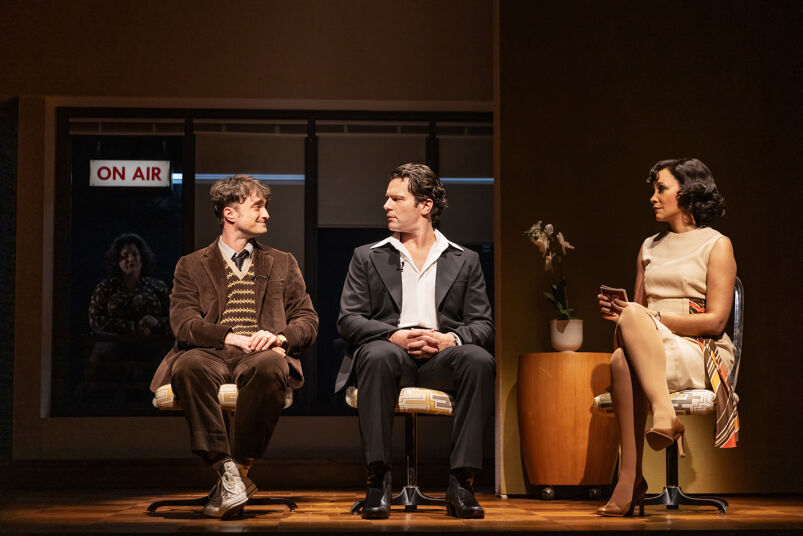
Matthew: I was poking around to find a queer connection to the show besides the fact that lots of gay people like musicals. Sondheim was gay but rarely put it front and center in his work. The only show I can think of is Road Show, originally titled Bounce, about two brothers’ Gold Rush adventure, and one of them is gay. I’m interested in Sondheim’s final musical, which he never finished, Here We Are, based on two surrealist films by Luis Buñuel. Some of our favorite old-school gays are in it — David Hyde Pierce (Frasier) and Denis O’Hare, who appeared in the original production of Take Me Out. But then I was reading Sarah Holdren’s review of this production in New York magazine, and she smartly pegs Soutra Gilmore’s scenic design as a reference to artist David Hockney — gay! So there’s that.
Kelsy: Yeah, I was really digging that mid-century design and would have liked to see more of that suggestion. Gilmore also designed the costumes, and I woke up realizing Frank wears black and white the entire time. Jonathan Groff, it’s really his show, even though it’s supposed to be about a trio of friends. I felt like it was the story of Frank with these two other people in his life, and, for me, some of that was due to the costuming. But it’s funny because black and white is Charley’s attitude. Frank is a bit more in the gray area of art versus success. But Charley almost implies it’s one or the other.
Matthew: I hadn’t thought about the visual comparison. In the second act, they attend a party thrown by Broadway star Gussie Carnegie (Krystal Joy Brown), and the room is filled with what she calls “the Blob,” and this kind of Greek chorus is all costumed in black and white. I love how she describes them to Frank — “I have invited the richest and the most influential people in this town tonight. Not one of whom is as rich or influential as you’re going to be. I call them the Blob. They absorb everything.”
At this point, it’s 1962, so it’s a period choice, but it also draws a clear delineation, like these two ideas are separate — personal and professional success. It’s almost like a physical embodiment of today’s social media, just this grotesque, tentacle-reaching monstrosity.
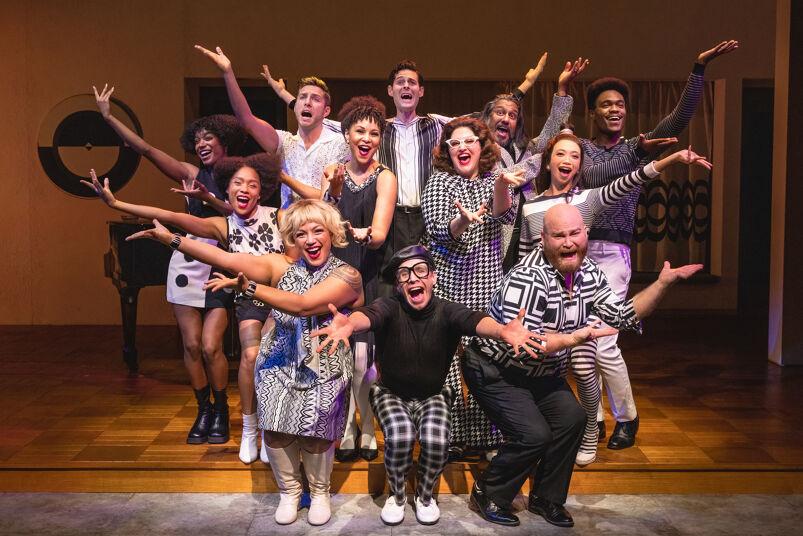
Kelsy: One of the most entertaining parts of the whole show is Tim Jackson’s choreography in that scene. But there’s another moment where Gussie asks the pair to sing a song from their yet-to-be-produced show, and the Blob loves it. And then she asks them to do it again, and they all lose interest. Social media didn’t exist back then, but Sondheim nails that fleeting societal pressure.
Matthew: The idea that we need to conform to succeed, for me, is queer-adjacent. Gussie reinvents herself. The line, gleefully said by her first husband, producer Joe Josephson (brilliantly played by Reg Rogers), is so gross. “She fixed the nose, she fixed the clothes, she fixed the name, and take a look what was underneath all that.” She does all these things to become the person she thinks she wants to be. I’ll never forget Lindsay Mendez’s acceptance speech when she won the 2018 Tony Award for Best Featured Actress in a Musical. “When I moved to New York, I was told to change my last name from Mendez to Matthews, or I wouldn’t work, and I just want to say how proud I am to be part of a community that celebrates diversity and individuality,” she said. “To all of you artists out there, be your true self, and the world will take note.”
Kelsy: There’s a later scene (but earlier in their careers) where Frank and Charley audition for Joe, and he tells them, “Give me a melody.” It’s like this clear direction: if you follow the formula, you will find success (or we will bequeath success). And Charley believes there’s no way to be an artist and have anything given to you.
Matthew: Have you found that true in your career as a writer?
Kelsy: I’ve had people who were angels and mentors in my life who helped me get to my next level. I had a boss who helped me move to New York. I transferred from a company based in Seattle to their New York office, which was very helpful. But then I promptly left that company and became a journalist! Hopefully, we all have some supportive person who gives us a helping hand. But mostly, it’s been my own sweat and tears. Isn’t that the nature of being a writer? This is what I’ve learned in my career: If you have fun and can laugh with people in your professional sphere, that’s how you get gifted with good experiences or gigs. Because folks just want to be around fun people, including me.
Matthew: Let’s talk about the character of Mary — decades of unrequited love! We can see how unhealthy that is, especially as it plays out in reverse.
Kelsy: I feel bad for her! It’s like, just say, “I love you.” The funny thing is, I see Lindsay Mendez as a bold actor, but her character isn’t, which was kind of frustrating.
Matthew: I’ve seen Merrily We Roll Along four times — three versions of this production directed by Maria Friedman and then at Washington D.C.’s Kennedy Center in 2002, where it was produced as part of an epic repertory summer of six of his works. This is the most pronounced and fractured interpretation of that relationship I recall, and I’m still unsure which works best for the overall storytelling.
Shifting gears, did you notice how many Gen Z theatergoers were in the audience? Two young women sat next to me, and one of them dashed to the lobby during intermission and bought a show poster, which was sweet. Side note — I’ve always wanted to start a Broadway flop coffee mug collection. Anyway, it had me thinking about how the musical has a multi-generational appeal. I also thought, how can you afford these tickets?! We were fortunate to receive press seats, but the show has been breaking box office records with a top ticket price of $499.
Kelsy: I thought the same thing! I think the two guys in front of us were Jonathan Groff fans, and maybe others were Radcliffe fans from the Harry Potter series.
Matthew: I guess I forgot what a mainstream appeal those two actors have, that fans might go to see a show not even knowing what it is because they want to see Daniel Radcliffe or Jonathan Groff. But regarding the show’s themes and how they may or may not resonate, I can only guess what those kids sitting in front of us or to the side see this as. A cautionary tale? Or like, “We’re never going to turn out like that. We’ll maintain our friendships and our integrity.” And then there’s the two of us sitting there, thinking, “Yeah, life can be a dumpster fire.”
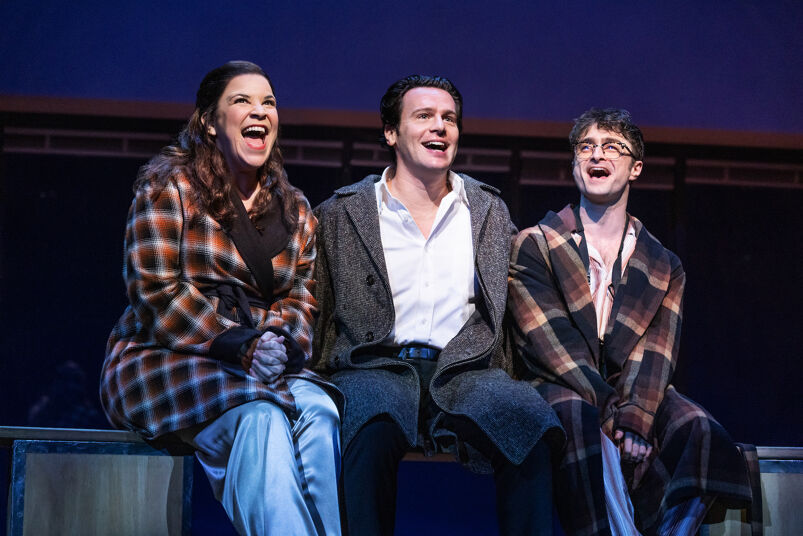
Kelsy: The guys sitting in front of us seemed touched by it. The final scene takes place in 1957, and Frank, Charley, and Mary gather on a New York City rooftop to look for Sputnik, the first artificial satellite. They kind of hugged and gave each other loving looks, and I thought, “What are you so touched by?” I think it’s a successful production, but what was so tender about it for them?
Matthew: When I saw it in D.C. over 20 years ago with one of my best friends from college, I remember weeping at the end. And in London, feeling equally gutted as they say in the U.K. As I’ve gotten older, I guess it’s more of an “aha” response, a kind of knowingness, that this is kind of what happens in life, and as Sondheim brilliantly wrote, “Now you know.”
Merrily We Roll Along plays at Broadway’s Hudson Theatre through March 24, 2024.
Edited for length and clarity.

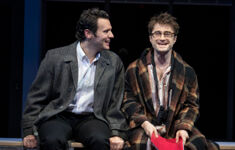



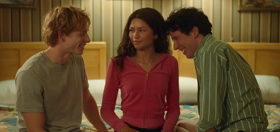

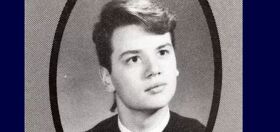




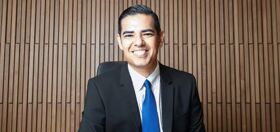


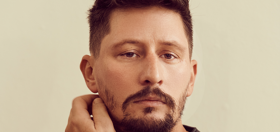

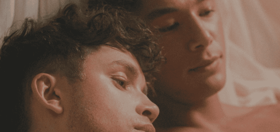

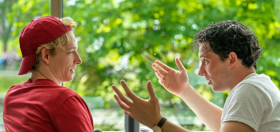

Jaesly
What a relief to read a theatre review with actual substance, not just “Daniel Radcliffe was so cute and Jonathon Groff is such a zaddy”. Another words for most who read this website TL:DR.
Pietro D
At last it’s the hit it always should have been!
dbmcvey
I wish I could see this! I saw the production in London and it was the best production of this show I’ve ever seen. I though that despite it’s fantastic score the show didn’t work and Maria Friedman proved me wrong! I’m so happy to be wrong here!
dedpubserv
Maria Freidman’s 2013 version which was simulcast to theaters in Europe (same basic production albeit with a different cast) is available on You Tube.
dedpubserv
I think Furth ‘s/Sondheim’s point wasn’t that you have to sacrifice artistic integrity to achieve fame and fortune (Sondheim wasn’t exactly living in a garret) but rather that Frank always chose the immediate satisfaction of his desires rather than considering the long term consequences of his actions. Consider the irony of the song “Growing Up” when in fact Frank never did.
Also in Sondheim’s book on his lyrics “Finishing the Hat” he explains that the party sequence with the song repeat and the resultant reception by “The Blob” actually occurred to him.
Glad you enjoyed the show.